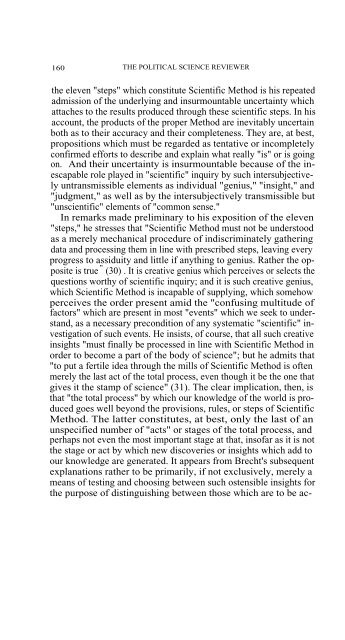ARNOLD BRECHT'S POLITICAL THEORY REVISITED Political ...
ARNOLD BRECHT'S POLITICAL THEORY REVISITED Political ...
ARNOLD BRECHT'S POLITICAL THEORY REVISITED Political ...
Create successful ePaper yourself
Turn your PDF publications into a flip-book with our unique Google optimized e-Paper software.
160<br />
THE <strong>POLITICAL</strong> SCIENCE REVIEWER<br />
the eleven "steps" which constitute Scientific Method is his repeated<br />
admission of the underlying and insurmountable uncertainty which<br />
attaches to the results produced through these scientific steps. In his<br />
account, the products of the proper Method are inevitably uncertain<br />
both as to their accuracy and their completeness. They are, at best,<br />
propositions which must be regarded as tentative or incompletely<br />
confirmed efforts to describe and explain what really "is" or is going<br />
on. And their uncertainty is insurmountable because of the inescapable<br />
role played in "scientific" inquiry by such intersubjectively<br />
untransmissible elements as individual "genius," "insight," and<br />
"judgment," as well as by the intersubjectively transmissible but<br />
"unscientific" elements of "common sense."<br />
In remarks made preliminary to his exposition of the eleven<br />
"steps," he stresses that "Scientific Method must not be understood<br />
as a merely mechanical procedure of indiscriminately gathering<br />
data and processing them in line with prescribed steps, leaving every<br />
progress to assiduity and little if anything to genius. Rather the opposite<br />
is true " (30) . It is creative genius which perceives or selects the<br />
questions worthy of scientific inquiry; and it is such creative genius,<br />
which Scientific Method is incapable of supplying, which somehow<br />
perceives the order present amid the "confusing multitude of<br />
factors" which are present in most "events" which we seek to understand,<br />
as a necessary precondition of any systematic "scientific" investigation<br />
of such events. He insists, of course, that all such creative<br />
insights "must finally be processed in line with Scientific Method in<br />
order to become a part of the body of science"; but he admits that<br />
"to put a fertile idea through the mills of Scientific Method is often<br />
merely the last act of the total process, even though it be the one that<br />
gives it the stamp of science" (31). The clear implication, then, is<br />
that "the total process" by which our knowledge of the world is produced<br />
goes well beyond the provisions, rules, or steps of Scientific<br />
Method. The latter constitutes, at best, only the last of an<br />
unspecified number of "acts" or stages of the total process, and<br />
perhaps not even the most important stage at that, insofar as it is not<br />
the stage or act by which new discoveries or insights which add to<br />
our knowledge are generated. It appears from Brecht's subsequent<br />
explanations rather to be primarily, if not exclusively, merely a<br />
means of testing and choosing between such ostensible insights for<br />
the purpose of distinguishing between those which are to be ac-
















